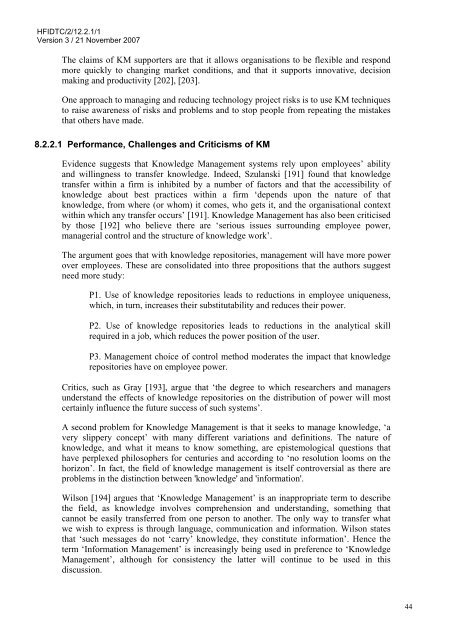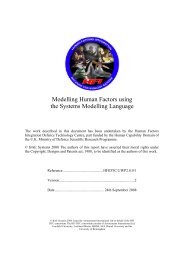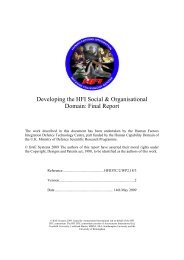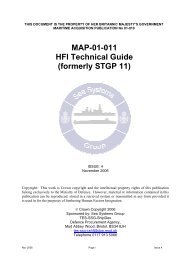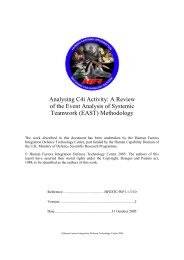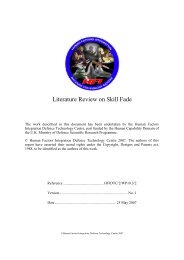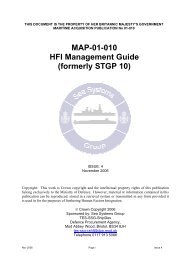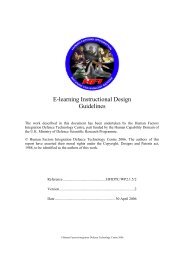The Impact of Technology Insertion on Organisations
The Impact of Technology Insertion on Organisations
The Impact of Technology Insertion on Organisations
You also want an ePaper? Increase the reach of your titles
YUMPU automatically turns print PDFs into web optimized ePapers that Google loves.
HFIDTC/2/12.2.1/1<br />
Versi<strong>on</strong> 3 / 21 November 2007<br />
<str<strong>on</strong>g>The</str<strong>on</strong>g> claims <str<strong>on</strong>g>of</str<strong>on</strong>g> KM supporters are that it allows organisati<strong>on</strong>s to be flexible and resp<strong>on</strong>d<br />
more quickly to changing market c<strong>on</strong>diti<strong>on</strong>s, and that it supports innovative, decisi<strong>on</strong><br />
making and productivity [202], [203].<br />
One approach to managing and reducing technology project risks is to use KM techniques<br />
to raise awareness <str<strong>on</strong>g>of</str<strong>on</strong>g> risks and problems and to stop people from repeating the mistakes<br />
that others have made.<br />
8.2.2.1 Performance, Challenges and Criticisms <str<strong>on</strong>g>of</str<strong>on</strong>g> KM<br />
Evidence suggests that Knowledge Management systems rely up<strong>on</strong> employees’ ability<br />
and willingness to transfer knowledge. Indeed, Szulanski [191] found that knowledge<br />
transfer within a firm is inhibited by a number <str<strong>on</strong>g>of</str<strong>on</strong>g> factors and that the accessibility <str<strong>on</strong>g>of</str<strong>on</strong>g><br />
knowledge about best practices within a firm ‘depends up<strong>on</strong> the nature <str<strong>on</strong>g>of</str<strong>on</strong>g> that<br />
knowledge, from where (or whom) it comes, who gets it, and the organisati<strong>on</strong>al c<strong>on</strong>text<br />
within which any transfer occurs’ [191]. Knowledge Management has also been criticised<br />
by those [192] who believe there are ‘serious issues surrounding employee power,<br />
managerial c<strong>on</strong>trol and the structure <str<strong>on</strong>g>of</str<strong>on</strong>g> knowledge work’.<br />
<str<strong>on</strong>g>The</str<strong>on</strong>g> argument goes that with knowledge repositories, management will have more power<br />
over employees. <str<strong>on</strong>g>The</str<strong>on</strong>g>se are c<strong>on</strong>solidated into three propositi<strong>on</strong>s that the authors suggest<br />
need more study:<br />
P1. Use <str<strong>on</strong>g>of</str<strong>on</strong>g> knowledge repositories leads to reducti<strong>on</strong>s in employee uniqueness,<br />
which, in turn, increases their substitutability and reduces their power.<br />
P2. Use <str<strong>on</strong>g>of</str<strong>on</strong>g> knowledge repositories leads to reducti<strong>on</strong>s in the analytical skill<br />
required in a job, which reduces the power positi<strong>on</strong> <str<strong>on</strong>g>of</str<strong>on</strong>g> the user.<br />
P3. Management choice <str<strong>on</strong>g>of</str<strong>on</strong>g> c<strong>on</strong>trol method moderates the impact that knowledge<br />
repositories have <strong>on</strong> employee power.<br />
Critics, such as Gray [193], argue that ‘the degree to which researchers and managers<br />
understand the effects <str<strong>on</strong>g>of</str<strong>on</strong>g> knowledge repositories <strong>on</strong> the distributi<strong>on</strong> <str<strong>on</strong>g>of</str<strong>on</strong>g> power will most<br />
certainly influence the future success <str<strong>on</strong>g>of</str<strong>on</strong>g> such systems’.<br />
A sec<strong>on</strong>d problem for Knowledge Management is that it seeks to manage knowledge, ‘a<br />
very slippery c<strong>on</strong>cept’ with many different variati<strong>on</strong>s and definiti<strong>on</strong>s. <str<strong>on</strong>g>The</str<strong>on</strong>g> nature <str<strong>on</strong>g>of</str<strong>on</strong>g><br />
knowledge, and what it means to know something, are epistemological questi<strong>on</strong>s that<br />
have perplexed philosophers for centuries and according to ‘no resoluti<strong>on</strong> looms <strong>on</strong> the<br />
horiz<strong>on</strong>’. In fact, the field <str<strong>on</strong>g>of</str<strong>on</strong>g> knowledge management is itself c<strong>on</strong>troversial as there are<br />
problems in the distincti<strong>on</strong> between 'knowledge' and 'informati<strong>on</strong>'.<br />
Wils<strong>on</strong> [194] argues that ‘Knowledge Management’ is an inappropriate term to describe<br />
the field, as knowledge involves comprehensi<strong>on</strong> and understanding, something that<br />
cannot be easily transferred from <strong>on</strong>e pers<strong>on</strong> to another. <str<strong>on</strong>g>The</str<strong>on</strong>g> <strong>on</strong>ly way to transfer what<br />
we wish to express is through language, communicati<strong>on</strong> and informati<strong>on</strong>. Wils<strong>on</strong> states<br />
that ‘such messages do not ‘carry’ knowledge, they c<strong>on</strong>stitute informati<strong>on</strong>’. Hence the<br />
term ‘Informati<strong>on</strong> Management’ is increasingly being used in preference to ‘Knowledge<br />
Management’, although for c<strong>on</strong>sistency the latter will c<strong>on</strong>tinue to be used in this<br />
discussi<strong>on</strong>.<br />
44


